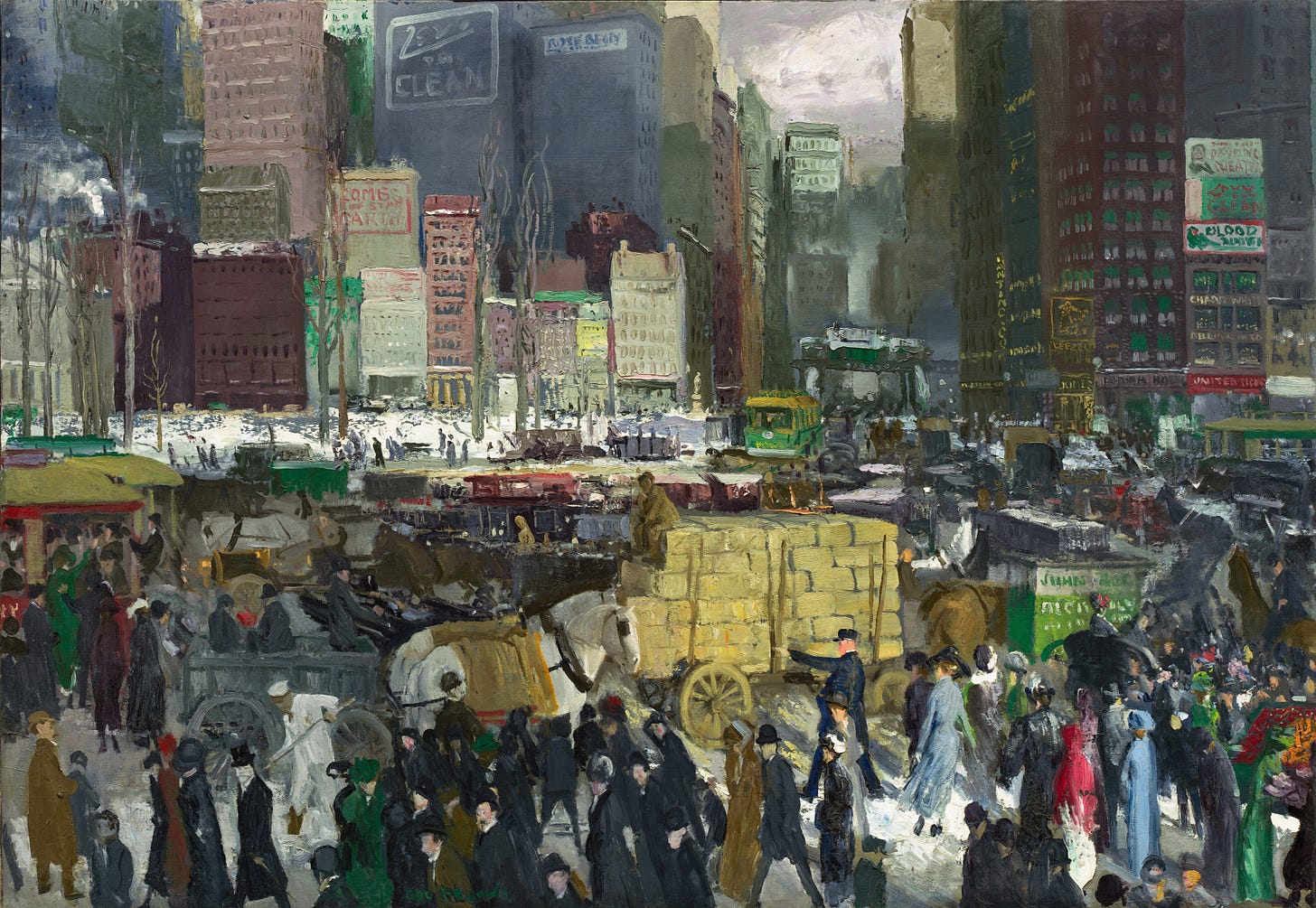Building Something Together
The Point of a Political Community
New York, George Bellows, 1911
When Hobbes once identified the guarantee of security as the first and most important duty of the State, he wasn’t wrong. However, the problem with this view is that it isn’t an end in itself. Security is what allows us to build a community.
While I sit back and watch as an erratic billionaire with no commitment to anything tear apart our government for scrap, I’ve thought a lot about what exactly the point of a shared political community is.
Hobbes answered the question of how it is you start a community—but he never quite grasped what a community should do to make itself worthy of continuation.
When we do politics, we do it with a certain idea of what we hope to achieve. We’re doing politics for a reason. We’re fighting over exactly who we want to be, and that fight is largely a fight over the idea of what we believe our community should be.
A political community is an abstract collective entity1 after all, and it only exists insofar as we believe that it does. The United States is not a physical entity, but rather an image that we all collectively share and participate in.
I don’t mean to imply that a political body is entirely immaterial. There are of course very real tangible material aspects of a political community (security is certainly real when you have to worry about an IED on your way to work)—but this hardly accounts for the question of what we’re doing when we’re doing things together.
Civic republicanism—the political ideology I most closely identify with—says that we do this in part as a collective struggle toward a political body that is dedicated to the betterment of all citizens. It is an idea that we can be the masters of our destinies wherein all citizens are owed the dignity of equality and liberty. It pledges a shared fraternal commitment to the achievement of great works on behalf of the entire community.
We all equally go to the moon together—and we all pay our taxes to ensure that every one of us can attend schooling.
It is the vision of America held to our highest ideals that I sincerely believe in.
We do not have a National Endowment for the Humanities because it is economically efficient to provide subsidies to poets. We do it because as a whole, the arts make us better. When we go to see a play at the Kennedy Center, we don’t do that because the Kennedy Center makes a profit, but because seeing Shakespeare performed makes us better citizens. The Smithsonian Museums do not have a positive balance sheet, but the fact that any member of the public can go and see Vincent Van Gogh for free makes us better as a nation.
When the United States provided military aid and assistance to Ukraine after Russia invaded their country, it wasn’t for the sake of being able to exploit their country for minerals. We helped our friends across the world because that is what a nation that believes in its professed ideals does. The promise of all men being equal does not stop at our borders.
Even when we do not live up to those ideals—and we quite frequently do not—it is not a license to abandon the highest sense of who we are and what we ought to be.
The fact that a large portion of our country has turned against all of this doesn’t mean that we should. The disinterest amongst segments of our country in the potential (or point) of our shared civic life does not absolve us of our commitment to being the examples of what we ought to be.
While the destruction of agencies like USAID or the widespread cessation of funding for grant programs will take the efforts of a generation to correct—it is still our responsibility to do so.
It is our responsibility because our polity exists for more than just us in this moment. It is meant for those who come after us as well. It is so they too can have poets, art, schools, and hospitals. It is so they too can have their own struggles in turning America more fully into the nation that it is meant to be.
One man exploiting his immense wealth to sell off our institutions for parts can’t take that from us. Ideals that fade when the world appears to be sliding out from beneath us were probably never truly held in the first place.
Some people might even call this some kind of “Imagined Community.”


Made me feel more patriotic than I've felt in years. Thanks James.
"When Hobbes once identified the guarantee of security as the first and most important duty of the State, he wasn’t wrong. However, the problem with this view is that it isn’t an end in itself. Security is what allows us to build a community." I was just talking to tom.paine about how the fact we are secure and stable enough for us to create state capacity and bureaucracy is itself a miracle. - forgot to finish my thought.